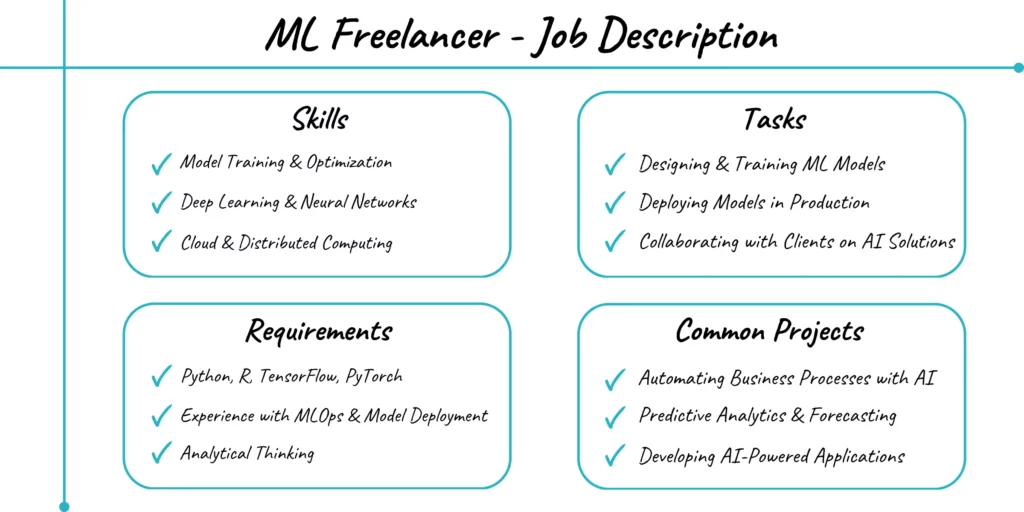Machine learning freelancers are becoming increasingly vital in today’s tech landscape as more companies integrate AI into their operations. With businesses across industries embracing machine learning to enhance customer experiences, streamline processes, and drive innovation, the demand for skilled specialists continues to grow.
This comprehensive guide explores what machine learning freelancers actually do, their essential skills, typical projects, and how they navigate the business aspects of freelancing in this rapidly expanding field.
What you will learn in this article:
Core Skills Required for Machine Learning Freelancers
Success as a machine learning freelancer hinges on mastering several core competencies that span technical prowess and specialised knowledge. These skills form the foundation for delivering high-quality solutions to clients across various industries.
Technical expertise in ML algorithms
A thorough understanding of machine learning fundamentals serves as the cornerstone for freelance success. Machine learning experts must grasp supervised, unsupervised, and reinforcement learning paradigms to build effective solutions. Proficiency in foundational algorithms, including support vector machines and linear regression, enables freelancers to tackle complex problems systematically. Furthermore, knowledge of deep learning and neural networks allows professionals to create sophisticated systems that simulate human brain functions.
Programming languages for machine learning
Python stands out as the primary language for machine learning projects, thanks to its extensive ecosystem of libraries like TensorFlow and scikit-learn. Java proves valuable for big data processing and real-time applications, particularly in enterprise environments. SQL maintains its importance for database management and data manipulation, whilst C++ excels in creating complex systems requiring low-level hardware integration.
Data preparation and analysis abilities
Data handling forms the bedrock of successful machine learning projects. Freelancers must excel in data cleansing, which involves converting data into usable formats and handling missing values. Strong analytical skills enable professionals to transform raw data into meaningful insights through various techniques and tools. Additionally, data visualisation capabilities help communicate complex findings effectively to clients.
Domain knowledge and specialisation
Beyond technical skills, domain-specific knowledge significantly enhances a freelancer’s value proposition. Understanding industry-specific nuances helps in asking relevant questions and choosing appropriate metrics that align with client objectives. For instance, when working with e-commerce projects, comprehending online retail dynamics enables more accurate analysis and solution development. Domain expertise also aids in:
- Incorporating relevant biases into training data
- Determining feature importance effectively
- Adjusting models to suit specific industry requirements
- Explaining results more clearly to stakeholders
Machine learning freelancers must continuously update their skills as the field evolves. Mastery of these core competencies, coupled with practical experience, positions professionals to deliver sophisticated solutions across various sectors, from healthcare to fintech.
Day-to-Day Activities of ML Freelancers
The daily routine of a machine learning freelancer encompasses various technical tasks and client interactions that shape successful project delivery. From handling complex datasets to fine-tuning models, these professionals juggle multiple responsibilities throughout their workday.
Data collection and preprocessing
A machine learning freelancer typically starts by reviewing existing code and projects, ensuring that models perform as expected. A significant portion of their time is spent on data collection and feature engineering—crucial steps in building effective machine learning solutions. This involves cleaning datasets to remove errors, handling missing information, and preparing data in a structured format. They also apply preprocessing techniques, such as normalization and encoding, to make data suitable for machine learning algorithms, setting the foundation for accurate and efficient model training.
Building and training machine learning models
Once the data is ready, freelancers focus on constructing and training models. This involves experimenting with various supervised learning algorithms, from Random Forest to Gradient Boosting, to identify the best-performing solution. They write code, design databases, and build upon existing projects to enhance performance. The process often includes fine-tuning hyperparameters through GridSearchCV and employing cross-validation techniques to gauge model generalisation capabilities.
Testing and validation
Testing forms a crucial part of model development. Machine learning freelancers divide their data into training, validation, and test sets to ensure robust model performance. The validation dataset helps evaluate the model during development, whilst the test set provides an unbiased assessment of the final model’s capabilities. They utilise various metrics, such as precision, recall, and F1 score, to measure model effectiveness.
Client communication and reporting
Freelancers stay closely connected with clients throughout a project, ensuring clear communication and collaboration. They provide regular updates, share feedback, and suggest improvements to keep projects on track. Building strong client relationships is key—clear expectations, detailed documentation, and prompt responses to requests help establish trust. Successful freelancers go beyond just delivering code; they offer insights, adapt to changing needs, and remain flexible when urgent issues come up. Strong communication and reliability not only keep projects running smoothly but also lead to long-term client partnerships.
Types of Projects ML Freelancers Handle
Machine learning freelancers tackle diverse projects across multiple industries, showcasing their expertise through specialised solutions that address specific business challenges. Their project portfolio spans several key domains, each requiring unique skills and approaches.
Predictive analytics projects
Freelancers develop sophisticated predictive models for various business applications. These projects often focus on sales forecasting, where specialists analyse historical data to predict future revenue patterns. They build models for price optimisation and competitive pricing strategies, whilst incorporating real-time data analysis. Notably, freelancers work on asset valuation and risk modelling projects that help businesses make informed financial decisions.
Computer vision implementations
Computer vision projects represent a substantial portion of freelance work, employing convolutional neural networks for enhanced accuracy. Freelancers create systems for facial recognition, medical image analysis, and vehicle detection in disaster scenes. Recent projects involve developing AI-powered floor replacement tools and fine-tuning text-to-video models. These specialists achieve remarkable accuracy rates, often exceeding 60% on complex image classification tasks.
Natural language processing solutions
NLP freelancers specialise in transforming complex language data into structured information that computers can process effectively. They work on projects ranging from automatic translation to biomedical text mining. Their expertise extends to creating sentiment analysis tools for social media monitoring and developing automated systems for medical report generation. These professionals also build sophisticated chatbots and implement information retrieval systems.
Recommendation systems
Recommendation engine development forms another crucial project category. Freelancers create personalised suggestion systems for e-commerce platforms and streaming services. They implement both collaborative and content-based filtering techniques to enhance user experience. These specialists work with large-scale datasets, often handling hundreds of millions of users and items simultaneously. Their projects span across digital retail, entertainment, and content delivery platforms, helping businesses boost user engagement through tailored recommendations.
Business Aspects of ML Freelancing
The business landscape for machine learning freelancers presents unique opportunities and challenges that require careful navigation. Understanding the key aspects of running a successful freelance practise ensures sustainable growth and client satisfaction.
Setting competitive rates
Machine learning freelancers often command premium rates due to their specialised expertise. Pricing varies depending on experience, project complexity, and industry demand. Long-term projects with consistent weekly hours tend to have steady, structured rates, while short-term advisory roles or high-impact consultations often come at a premium.
Freelancers with niche expertise, such as time series analysis or advanced forecasting, typically secure higher compensation than generalists. Factors like geographical location and the specific needs of the client also influence overall earnings, making flexibility and specialization key to maximising opportunities in this field.
Finding clients and building a portfolio
A compelling portfolio serves as a crucial tool for attracting clients. Successful portfolios showcase practical implementations, quantified results, and clear documentation of problem-solving approaches. Freelancers often find clients through university partnerships, professional networks, and specialised platforms. Creating detailed case studies demonstrating real-world impact helps establish credibility with potential clients.
Managing project timelines
Effective timeline management involves breaking complex projects into manageable tasks whilst considering dependencies and resource allocation. Machine learning freelancers must allocate sufficient time for data preparation, model training, and thorough testing. Regular monitoring and adjustment of project timelines ensure deliverables meet quality standards without compromising deadlines.
Handling intellectual property concerns
Intellectual property protection requires careful consideration in machine learning projects. Freelancers must understand copyright implications, especially when training AI models with existing datasets. Written agreements should clearly outline IP ownership, usage rights, and confidentiality terms. Non-disclosure agreements prove essential before sharing project ideas with potential clients. Furthermore, freelancers should maintain detailed documentation of model development processes to establish ownership evidence.

Conclusion
Machine learning freelancing offers a dynamic and rewarding career for those with strong technical skills and business acumen. Success in this field requires a balance of advanced ML expertise, project management, and client communication.
As AI becomes more integral to business, staying updated with industry trends is crucial. Continuous learning, including certifications like those in this guide, helps freelancers stay competitive. By mastering both technical and business aspects, ML professionals can build lasting, high-value careers in this fast-growing field.


